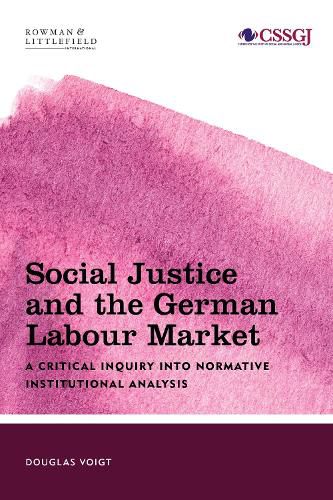Readings Newsletter
Become a Readings Member to make your shopping experience even easier.
Sign in or sign up for free!
You’re not far away from qualifying for FREE standard shipping within Australia
You’ve qualified for FREE standard shipping within Australia
The cart is loading…






The neoliberal transformation of welfare state institutions has intensified social inequalities, raising questions of social justice across European varieties of capitalism. In Germany, this transformation occurred with Third Way social democracy and the consequent Hartz reforms. After ten years of reducing unemployment, this ‘Hartz Regime’ is now cited as a model for reforming other European political economies. Despite this apparent success, it has also received criticism for exacerbating the social injustices of neoliberal capitalism, ultimately leading to the question: how do we know if the German Hartz Regime is socially just?
Drawing on the Frankfurt School of critical theory, this study demonstrates not only how to develop a theory of social justice for empirically studying labour market institutions, but also illustrates it through an extensive study of the German case. The result is both unsurprising and reinforces classical social democratic concerns: not only the Hartz Regime, but capitalism itself, is inherently unjust. By accepting this previously recognised conclusion, the book provides a critical framework for the normative evaluation of empirical institutions, effective for studying the varieties of social (in)justice in contemporary capitalism beyond Germany.
$9.00 standard shipping within Australia
FREE standard shipping within Australia for orders over $100.00
Express & International shipping calculated at checkout
The neoliberal transformation of welfare state institutions has intensified social inequalities, raising questions of social justice across European varieties of capitalism. In Germany, this transformation occurred with Third Way social democracy and the consequent Hartz reforms. After ten years of reducing unemployment, this ‘Hartz Regime’ is now cited as a model for reforming other European political economies. Despite this apparent success, it has also received criticism for exacerbating the social injustices of neoliberal capitalism, ultimately leading to the question: how do we know if the German Hartz Regime is socially just?
Drawing on the Frankfurt School of critical theory, this study demonstrates not only how to develop a theory of social justice for empirically studying labour market institutions, but also illustrates it through an extensive study of the German case. The result is both unsurprising and reinforces classical social democratic concerns: not only the Hartz Regime, but capitalism itself, is inherently unjust. By accepting this previously recognised conclusion, the book provides a critical framework for the normative evaluation of empirical institutions, effective for studying the varieties of social (in)justice in contemporary capitalism beyond Germany.